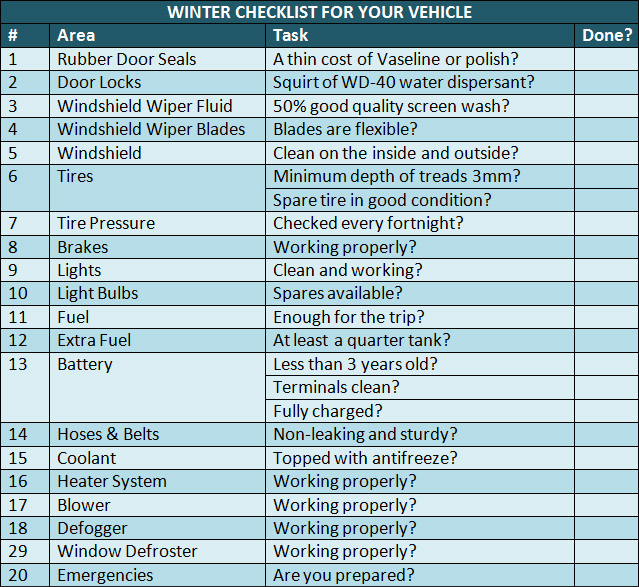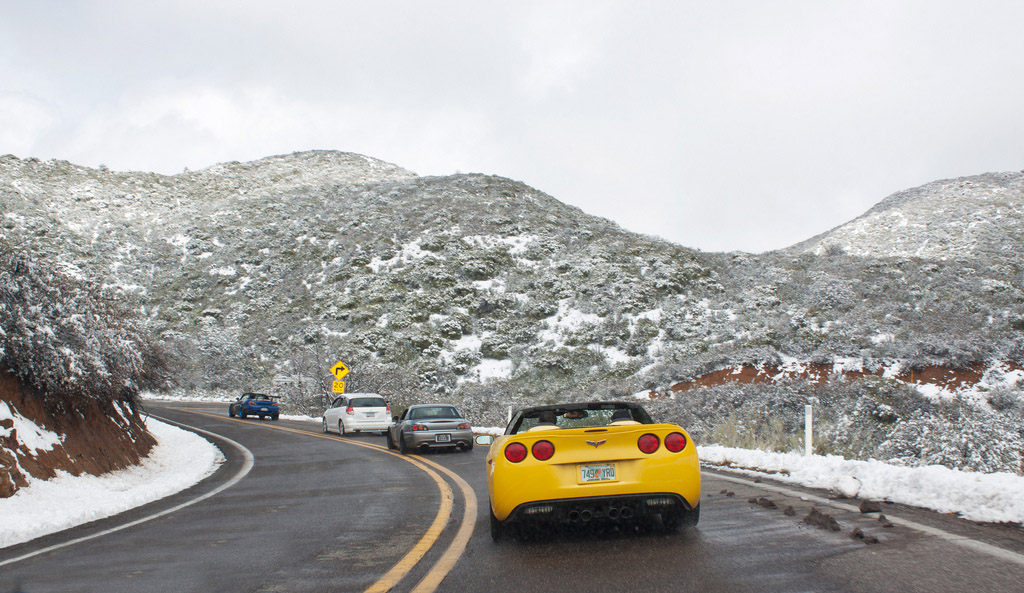Whatever the weather condition, checking and keeping your car in top shape is of utmost importance. This requirement assumes serious importance if the area is prone to severe winters. Cold weather tests the vehicle’s preparedness and finds overlooked weaknesses like no other. By following our simple 20-point checklist you can prepare your vehicle for the most severe weather in the area.

Doors and Windshield
Prevent doors from freezing shut by applying a thin coating of Vaseline on the rubber seals. At the same time, squirt some WD-40 type of water dispersant into the door locks to prevent them from freezing. Winters can bring sleet as well as snow and your windshield wiper blades must be flexible to remove water from the windshield. Make sure that you have some good quality screen wash that has antifreeze in it – mix about 50% with water – for cleaning the snow accumulated on the windshield. Ensure that your windshield is clean on both the inside and outside to prevent dazzle from the low winter sun.
Tires and Brakes
Pay extra attention to the tires as these are the primary contact points with the road. In winter, as during rain, the road may be wet or may even be covered with a thin layer of ice. It is important that tires have a good grip to prevent skidding. Check the tire treads, which should be more than 3mm deep. Every fortnight, check the pressure in each tire, as well as the condition of your spare tire. You may also consider changing over to tires especially meant for winter driving. Icy roads may sometimes require chains on tires for additional traction. Additionally, make sure the brakes, including the parking brake, are working properly.
Lights
Driving in winter, especially at night, requires remaining visible to others and being able to see others clearly. Check that all interior and exterior lights, including your turn signals, on your vehicle are functioning as intended and that you are carrying extra light bulbs in case of any failure.

Fuel
Winter conditions introduce many uncertainties on the way and one of them is running out of fuel before you can reach the next gas station. Make sure that the gas tank is carrying the necessary amount of fuel every time you head out, and that there is at least a quarter of a tank extra for emergencies.
Batteries
Cold weather affects batteries rather drastically. Therefore, make sure that the car battery will not die on you on the way. On the day before any long journey, have your battery checked by an authorized service person to see that it is in good working condition, especially if it is nearing or has crossed its three-year life span.
Fluids, Hoses, and Belts
Freezing winters can freeze coolants, ruining your day, unless you have taken care to top it up with good quality antifreeze. It may be necessary to use 10- to 30-weight single viscosity oil for lubrication and transmission in older cars if temperatures persist in staying below freezing. Winter temperatures also cause hoses to leak and belts to crack – inspect regularly and replace if necessary.
Interior
On the inside of the vehicle, check that its heater system is functional. Additionally, check that the blower, defogger and window defroster are in proper working condition. Finally, be prepared for any emergency on the icy roads, and you and your vehicle are ready for that winter drive.
Photo by Alan Stark on Flickr, used under Creative Commons license – https://www.flickr.com/photos/squeaks2569/5606648731/
Speak Your Mind